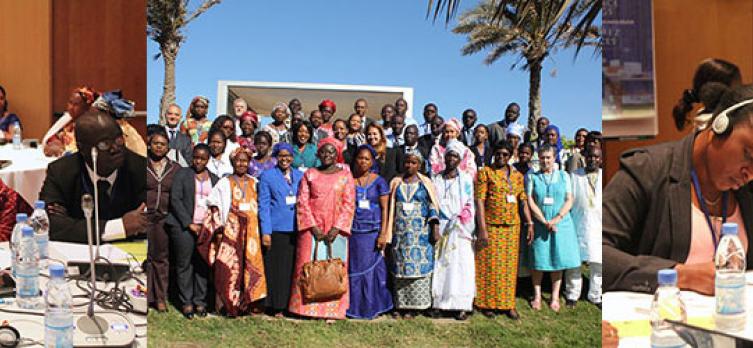Events
Improving gender equality and social inclusion remains critical to fully realizing the development impacts of energy programs. Energy affects women and men differently, as men and women have different roles and responsibilities in households, markets and their communities, which makes their access, use, and impact of energy services also different. Since 2010, the Africa Renewable Energy and Access (AFREA) Gender and Energy Program has piloted approaches, developed analytical resources, and worked with energy teams and government clients on integrating gender into existing and new energy access operations.
The program has been supporting activities in 6 countries: Senegal, Mali, Benin, Tanzania, Kenya and Zambia. As part of this work, a Gender and Energy Capacity Building and Knowledge Exchange workshop was held in Dakar, Senegal on April 7-9, 2014. The workshop provided a forum for country counterparts to document the lessons and approaches on integrating gender issues into their energy programs under the first phase of AFREA (AFREA I), and to begin planning activities under AFREA II.
The workshop was attended by about 60 participants, including representatives from the six pilot countries; project beneficiaries from the Senegal Sustainable and Participatory Energy Management (PROGEDE II) project; and representatives of development partner institutions from ENERGIA, UN Women, the Embassy of Denmark, ECOWAS Center for Renewable Energy and Energy Efficiency (ECREE) Gender Program, and Netherlands Development Organization (SNV).
Key outputs of the workshop included the development of country notes that will capture the approaches, results, and lessons learned under the various country initiatives and country road maps to develop next steps and aspirations for the second phase of the program. In addition, ESMAP and the World Bank Institute (WBI) introduced new gender and energy e-learning modules. These modules will be made available in mid-2014 on the e-Institute webpage.
| Workshop Materials |
-
Presentations by Session:
Session 1 | Sharing Country Experiences through Story Telling
Session 2 | Gender and Energy Training and Capacity Building
1. Overview of Gender Equality and Energy Issues
2. Gender Equality and Energy Access
Session 3 | Mainstreaming Gender Issues in Practice
1. Strategies of Women Leaders in Implementing AFREA Projects
Session 4 | Project Design and Implementation Tools
1. Demystifying Monitoring and Evaluation
2. Hearing from our Development Partners | Danish Embassy in Mali
3. Hearing from our Development Partners | ECOW-GEN
4. Hearing from our Development Partners | ENERGIA
5. Hearing from our Development Partners | SNV
6. Hearing from our Development Partners | UN Women DRC
Session 5 | Looking Ahead and Developing Our Road Map
Session 6 | Networking Approaches, CoPs, Tips and Tricks
1. A Journey through a Community of Practice (COP)
2. How To Build a Communicty of Practice (COP)
Session 7 | Action Planning to Achieve Results
1. Benin
2. Kenya
3. Mali
4. Senegal
5. Tanzania
6. Zambia
Contact: Vanessa Lopes-Janik
Read more about the ESMAP/AFREA Gender and Energy Program
